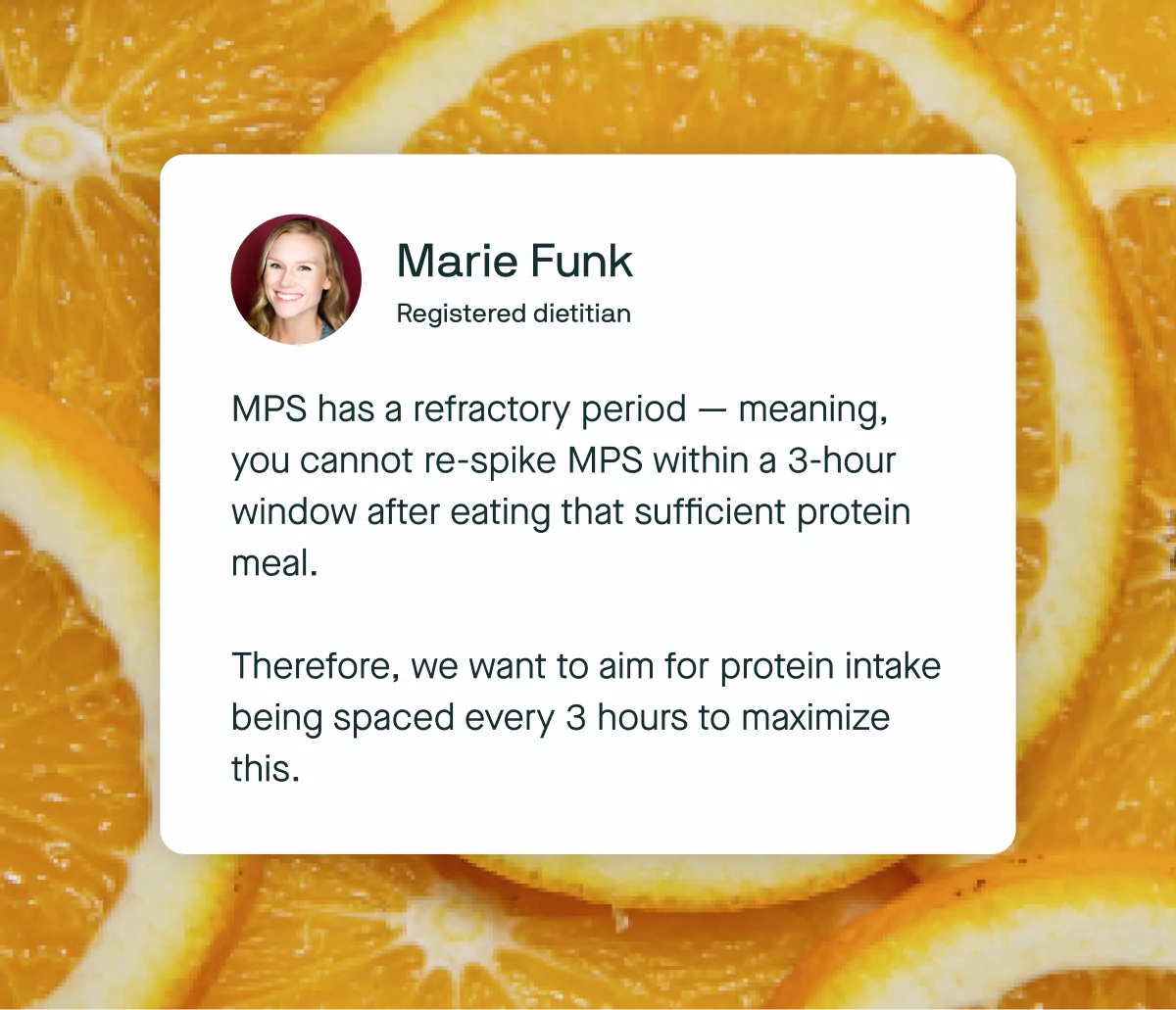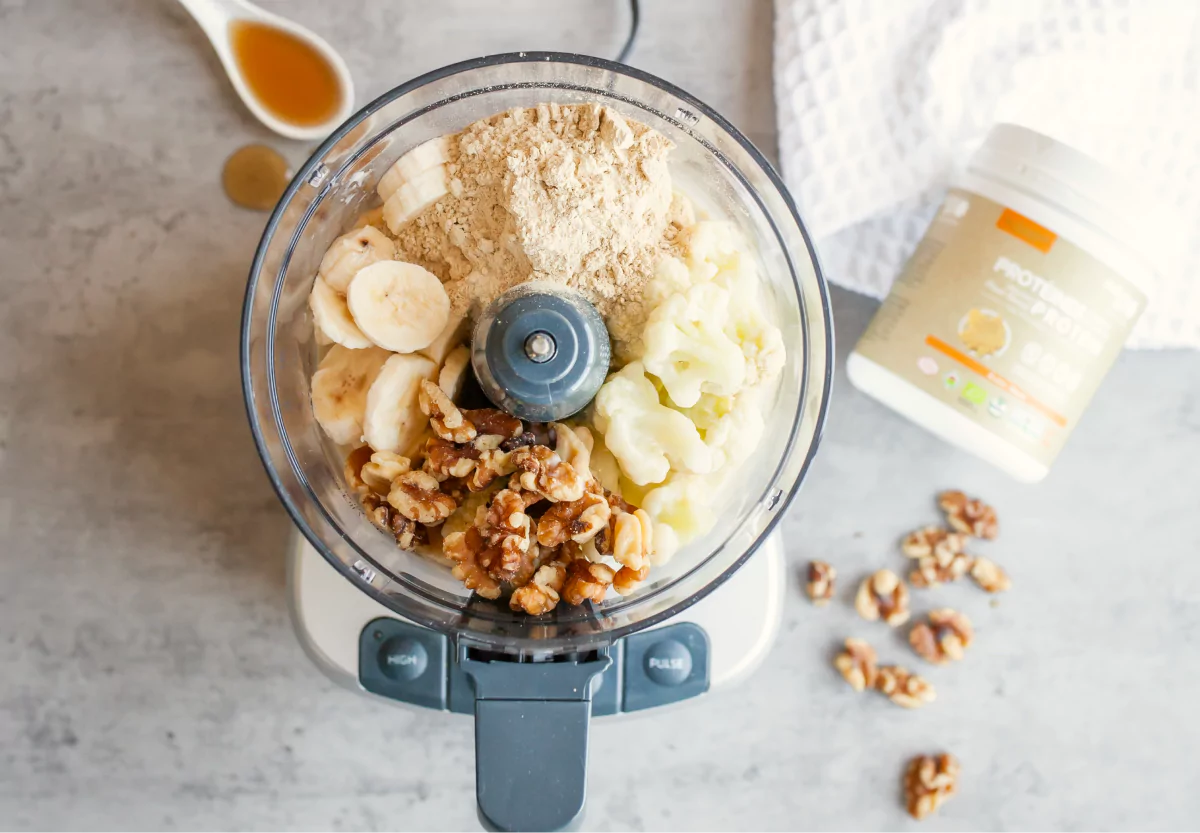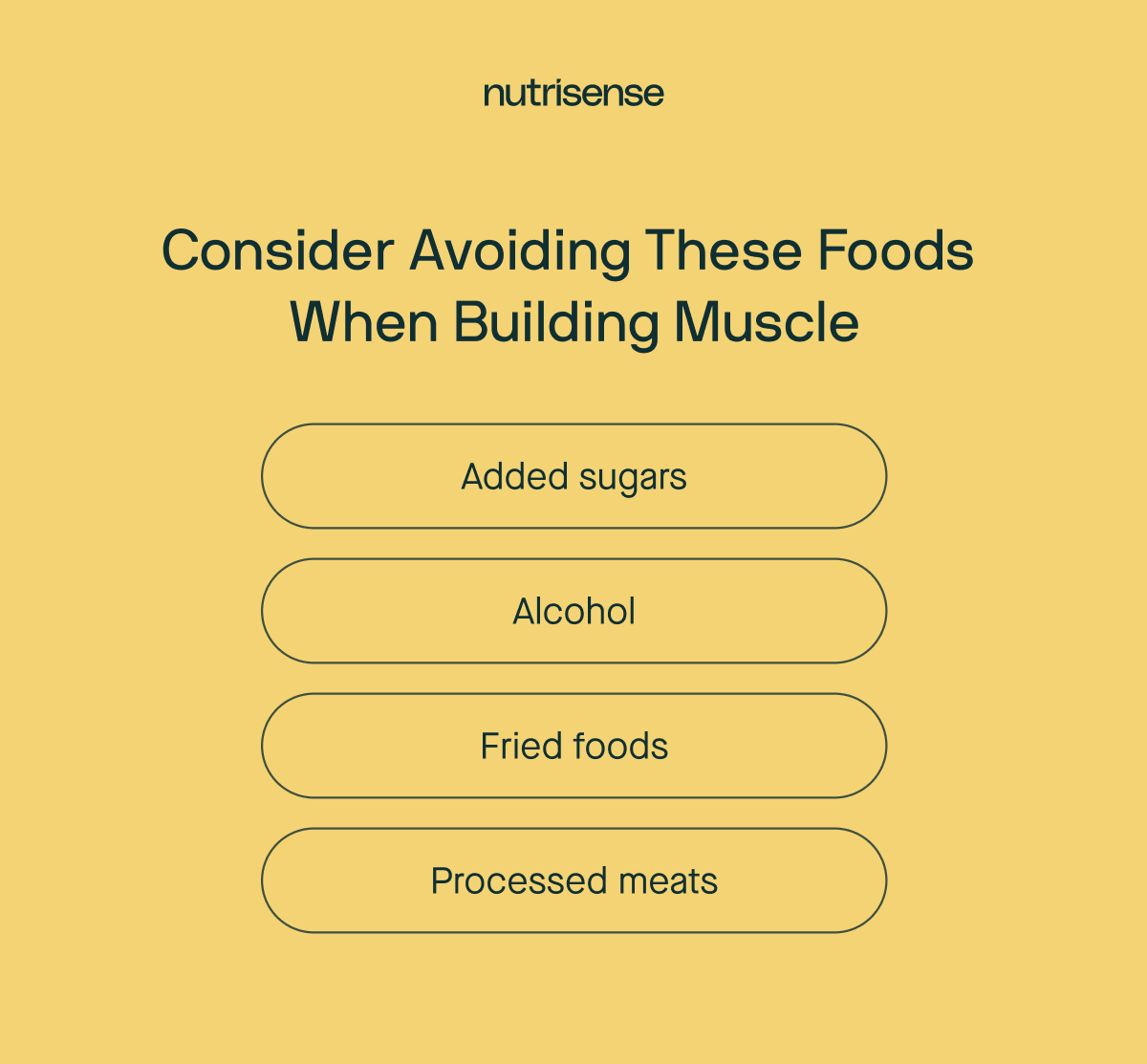What is the Best Diet for Muscle Growth?

Key Takeaways
Whether you're a dedicated athlete, a fitness enthusiast, or just want to feel stronger, building muscle requires more than just a dedicated workout routine. Your dietary choices and nutritional strategy are just as important.
But with so many popular diets out there, how can you know you’re following an eating plan that works for you if your goal is to gain muscle? Read on to explore the key components of an optimal diet for muscle growth, and which foods you may want to limit.
Creating an Ideal Diet for Your Muscles

An effective muscle-building diet should be customized to your goals, needs, body composition, and conditioning level. There is no "one-size-fits-all" approach when it comes to fueling for muscle growth, and your individual goals should dictate your calorie and macronutrient intake.
Body composition—or your lean muscle mass and body fat percentage—also impacts nutritional needs. People who are more active require more calories to sustain energy expenditure, while those with sedentary lifestyles may need fewer calories.
This is where a registered dietitian or nutrition expert can come in and help you create a plan tailored to your unique goals and health needs. With that in mind, let’s take a look at the fundamental building blocks of a diet that promotes muscle growth with some pro tips from one of our expert strength-focused Nutrisense dietitians, Marie Funk, RD.
Personalize Your Calorie and Macronutrient Targets
To start out, you’ll first want to determine an ideal calorie target to design your diet around. Being in a slight calorie surplus can support muscle growth, optimize the process of hypertrophy, and can help facilitate muscle repair and overall development.
Calculating and adjusting your ideal calorie intake will depend on your individual goals, body composition, and activity levels. To promote muscle growth, you might aim for a moderate calorie surplus, typically around 250 to 500 calories above your personal maintenance level.
However, working with a trained professional, such as a registered dietitian with a sports nutrition specialty may give you an added layer of personalization. You'll also want to monitor and track changes in weight, strength, and body composition over time and make adjustments as needed.
As Marie describes,
“We build muscle through a process of Muscle Protein Synthesis (MPS), which is stimulated by a protein kinase called mTOR.”
This is stimulated by three main factors:
- Protein (amino acids, with leucine being the most important)
- Insulin
- Muscle contraction
At the same time, muscle protein synthesis can also be inhibited by:
- Inactivity
- Overtraining
- Severe energy/caloric deficit
- Lack of essential or adequate amino acids
- Cortisol
- Alcohol
- NSAID drug treatment
- Muscle wasting disease states
- The natural process of aging
Protein
Adding protein to your diet isn’t only important for bodybuilding. Protein plays a pivotal role in muscle synthesis, a process crucial for muscle growth and repair.
During resistance training and physical activity, muscle fibers undergo microscopic damage. Following a high-protein diet provides the essential amino acids needed to repair and rebuild these damaged fibers, ultimately leading to muscle growth and increased strength.
If you’re not getting enough protein, your body may struggle to repair muscles effectively. Protein intake recommendations vary based on individual factors such as body weight, activity level, and specific goals.

- Active Individuals: If you're moderately active or participate in endurance activities, a protein intake of 1.2 to 2.0 grams per kilogram of body weight is recommended.
- Resistance Training/Muscle Building: Those aiming for muscle growth through strength training may need to aim for higher protein intake. Recommendations range from 1.6 to 2.2 grams of protein per kilogram of body weight.
These recommendations can provide a general framework, but your personalized protein needs can vary. Factors such as age, gender, metabolism, and training intensity also influence protein requirements.

Healthy Fats
Healthy fats, like omega-3 fatty acids and monounsaturated fats, are an essential component of a balanced diet and play an important role in hormone regulation and overall health. Saturated fats in moderate amounts may be just fine for many people as well. Fats provide the building blocks for hormones, including testosterone, which is particularly important for muscle growth and repair.
Insufficient fat intake can disrupt hormone synthesis, potentially affecting muscle-building efforts. To incorporate healthy fats into your diet:

- Include Plant-Based Fats: Avocado, nuts, seeds, olives, and olive oil are excellent sources of monounsaturated fats as well as some other polyunsaturated fats.
- Include Omega-3s: Fatty fish like salmon, tuna, trout, mackerel, and sardines are all excellent sources of omega-3 fatty acids DHA and EPA, which can support muscle mass and muscle performance. Note that plant-based options such as walnuts, flax, and chia, are not good sources of omega 3 fatty acids for humans. These sources provide a precursor fatty acid, ALA, and the human enzyme in charge of this process has a very low conversion rate.
- Moderate Saturated Fats: While some saturated fat is acceptable, it's important to moderate your intake, focusing on lean protein sources and whole foods.
- Limit Trans Fats: Avoid trans fats found in processed and fried foods, as they have negative health effects.
Carbohydrates
Carbohydrates play a crucial role in fueling workouts and supporting muscle growth. They are instrumental in providing the energy required to power through workouts. Consuming an adequate amount of carbs before and during a workout can enhance endurance, strength, and overall exercise performance.
Carbohydrates also play an important role in replenishing glycogen stores. Glycogen, stored in muscles and the liver, serves as a readily available energy source during physical activity.

Different types of carbohydrates may serve different roles in a diet optimized for building muscle. Complex carbohydrates, which are found in foods like whole grains, starchy vegetables, and legumes offer a steady release of glucose into the bloodstream. This gradual and sustained release helps maintain stable blood sugar levels, preventing energy crashes and promoting sustained energy throughout your day or workout.
However, certain simple carbohydrates such as fruit may have their benefits at times. Considering the impact of carbohydrates, including their glycemic index, is important, especially for individuals monitoring their health and fitness goals.
Continuous glucose monitoring programs like Nutrisense can offer valuable insights into how different carbohydrates affect your blood sugar levels, helping you make informed dietary choices to optimize performance and recovery.
Pay Attention to How You Eat Before, During, and After Workouts
In addition to your overall dietary intake, focusing on how, when, and what you eat relative to your workouts is important.

“Your pre-workout meal is ultimately the most important meal of the day in regard to strength training performance and muscle hypertrophy goals. That being said, meal composition and meal timing are two key factors that make a solid pre-workout meal.”
Below are some tips when it comes to leveraging the timing of your meals and building muscle.
Pre-Workout
- As a general rule of thumb, the ideal time for a pre-workout meal is one to one and a half hours before training. You may need to experiment a bit to find what foods work best for you at what times.
- Protein: Shoot for at least 0.5 grams per kilogram of body weight.
- Carbs: Aim for about one gram per kilogram of body weight, preferably coming from a lower glycemic source, plus a serving of fruit. Adequate glycogen stores going into a workout have been shown to help prevent protein breakdown during workouts.
- Fat: Should be limited to zero to 20 grams, since it slows the rate of digestion. It comes down to how close the meal is to training time.
Pre-exercise fluids are critical to prevent dehydration. According to registered dietitian Lee Murphy from the National Academy of Sports Medicine, it’s helpful to allow time to excrete excess fluid by starting at least 4 hours before an activity and aiming for an intake of five to seven milliliters of water per kilogram of body weight.
It is generally ideal that any foods consumed less than one hour before an event or workout be blended or liquified such as in smoothie form to promote rapid stomach emptying. You should experiment with the size, timing and composition of pre-event/activity meals to determine what will be best tolerated for your body.
During and After Training
- Consume about 30-60 grams of carbohydrate per hour during extended exercise. Make sure to adjust this according to your individual sweat rate, tolerance and exertion levels.
- Replenish glycogen post-workout may support muscle growth and prevent breakdown.
- Include protein on par with the amount consumed in pre-workout. Pre- and post-workout meals should not be separated by more than four to five hours.
Supplements For Muscle Building
While a well-balanced diet of whole foods should always be the foundation of your nutrition plan, some supplements might provide targeted benefits that may help you support your fitness goals. Examples of these supplements include:

Protein Powders
Protein shakes offer a convenient way to increase your protein intake. Whey protein, derived from milk, is quickly absorbed and contains all essential amino acids. Plant-based options like pea, rice, and hemp protein are also available.
Creatine
Creatine is one of the most popular supplements for promoting muscle growth and improving performance. It may enhance the body's capacity to produce energy rapidly during high-intensity activities, such as weightlifting and sprinting.
BCAAs
BCAAs—leucine, isoleucine, and valine—are amino acids that some suggest may also be beneficial in supplement form for muscle recovery and reducing muscle breakdown during intense workouts. However, the studies showing benefit were short term and did not show that supplementing with BCAAs is superior to getting them from dietary sources. Dietary sources of BCAAs include:
- Chicken breast
- Salmon
- Dairy products
- Eggs
- Quinoa
- Lentils
Remember, supplements are meant to enhance, not replace, a solid nutrition and training plan. If you have underlying health conditions or are taking medications, consult a healthcare professional before introducing new supplements.
The Best Foods for Muscle Growth Diets
No single food is ideal for muscle growth. Rather, it’s important to consume adequate macronutrients and micronutrients timed appropriately. Sources of protein may include:
- Seafood, poultry, and other meats
- Eggs
- Dairy (such as cottage cheese or Greek yogurt)
- Soy products
- Beans/legumes
- Seeds/nuts
The amount of protein as well as the specific amino acid profile of these different foods may vary quite a bit. Foods containing higher amounts of the amino acid leucine have been suggested by some to offer exceptional muscle-building support.
They say that while leucine may provide some benefit, combining it with other amino acids, vitamins, and minerals appears to be more beneficial than leucine by itself. Other carbohydrate-rich foods and fat-rich foods may provide support for MPS and muscle health, as discussed above. However, the amount and ratio of carbs and fats required and tolerated by each person may be a little different.
Now that we've explored the building blocks of a muscle-building diet, let's talk about some specific muscle-building foods that provide the essential nutrients your body needs for sustained progress.
What to Avoid in Your Diet When Building Muscle

As we focus on the foods that can benefit muscle growth, it's equally important to be mindful of dietary choices that can hinder your progress. Here’s what to avoid when trying to build muscle.
Excessive Added Sugars
Excessive added sugars in your diet can contribute to unwanted weight gain, inflammation, and insulin resistance. Rather than relying on sugary snacks and beverages, opt for natural sources of sweetness like fresh fruits, which provide vitamins, fiber, and antioxidants while minimizing the negative impacts of added sugars.
Alcohol
Alcohol consumption can hinder muscle gain by disrupting protein synthesis and nutrient absorption. Additionally, alcohol consumption can lead to dehydration, impacting muscle function and recovery. Limiting or avoiding alcohol is recommended for those who want to build muscle and maintain overall fitness progress.
Fried Foods
Fried foods can hinder muscle gain due to their high levels of unhealthy trans fats, excess calories, and potential for promoting inflammation, which can contribute to weight gain. Opt for healthier cooking methods like grilling, baking, or sautéing with minimal oil to reduce unhealthy fats while preserving the nutritional value of your meals.
Processed Meats

Processed meats are high in sodium, unhealthy fats, and preservatives, which can contribute to inflammation and weight gain. Processed meats often lack the beneficial nutrients found in lean, unprocessed sources of protein, like grilled chicken, turkey, fish, or plant-based options like legumes and tofu.
Find the right Nutrisense programto turn insight into progress.
Go Beyond Glucose Data with Nutrisense
Your glucose can significantly impact how your body feels and functions. That’s why stable levels are an important factor in supporting overall wellbeing. But viewing glucose isn't enough. Nutrisense, you’ll be able to learn how to use your body's data to make informed lifestyle choices that support healthy living.
One-to-one coaching
Sign up to access insurance-covered video calls to work with a glucose expert: a personal registered dietitian or certified nutritionist who will help tailor your lifestyle and diet to your goals.
Monitor and measure what matters
With the Nutrisense CGM Program, you can monitor your glucose with health tech like glucose biosensors and continuous glucose monitor (CGM)s, and analyze the trends over time with the Nutrisense App. This will help you make the most informed choices about the foods you consume and their impact on your health.
Find your best fit
Ready to take the first step? Start with our quiz to find the right Nutrisense program to help you take control.

Heather is a Registered and Licensed Dietitian Nutritionist (RDN, LDN), subject matter expert, and technical writer, with a master's degree in nutrition science from Bastyr University. She has a specialty in neuroendocrinology and has been working in the field of nutrition—including nutrition research, education, medical writing, and clinical integrative and functional nutrition—for over 15 years.




